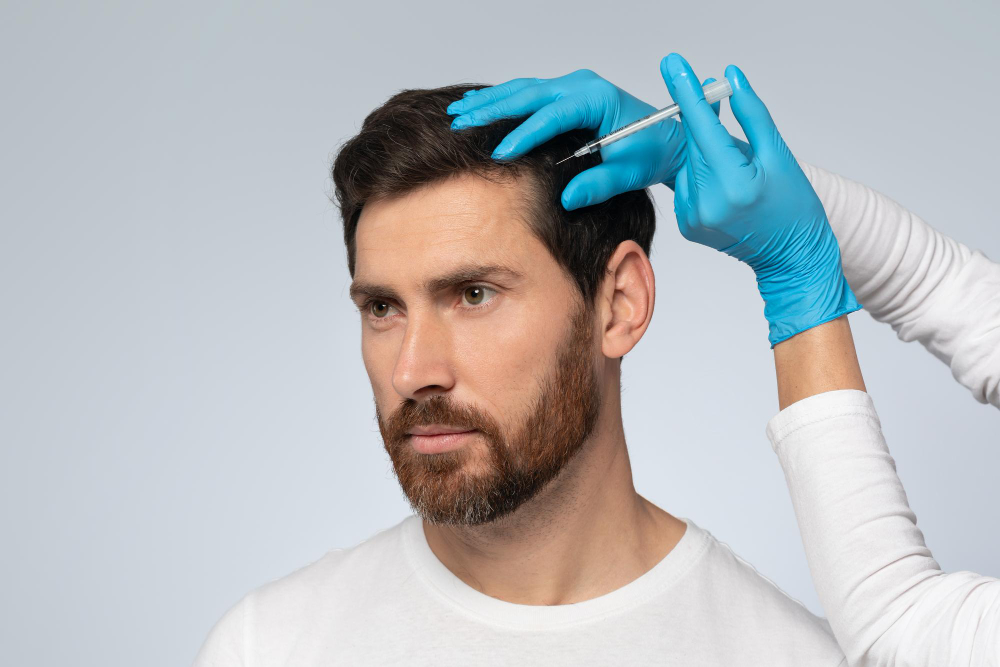Comprehensive review of the most up-to-date evidence for the use of PRP in the treatment of Pattern Hair Loss
Platelet-rich plasma (PRP) therapy has gained attention as a promising treatment for pattern hair loss (PHL), including androgenic alopecia (AGA) and female pattern hair loss (FPHL). Over the past decade, systematic reviews and meta-analyses have examined PRP’s efficacy and safety in promoting hair regrowth.
At Rejuvence Clinic, we specialise in the treatment of Hair loss using advanced platelet plasma (PRP). We offer a range of PRP treatment based on the final achieved platelet concentration in the plasma ranging from two fold increases in our Level 1 offering, up to 4 to 5 times increase concentration in our Level 2 Magellan system and Level 3 Angel Arthrex system. Our level two and three also provide a much larger volume of PRP allowing for a thorough treatment and the ability to treat a larger surface area. As part of our commitment to evidence based treatment practice we regularly review the available medical literature to assess our practices and reflect on the approaches we have used in the treatment of Hair loss as well as the many other conditions and treatments we offer at Rejuvence Clinic . As part of this process we have carried out a comprehensive review and summarise the findings of the most recent evidence and articles published on the use of PRP for Hair loss and specifically pattern Hair loss in both men and women.
Efficacy of PRP for Hair Loss
- Overall Effectiveness:
- PRP has shown significant improvements in hair density, thickness, and growth rates. Multiple studies demonstrate its ability to enhance follicular angiogenesis and prolong the anagen (growth) phase of hair follicles.
- Meta-analyses report increases in hair count and hair shaft diameter after repeated PRP treatments.
- Comparison with Other Treatments:
- PRP has been compared to conventional treatments like minoxidil and finasteride. A systematic review by Li et al. (2024) highlighted that PRP provides comparable efficacy to topical minoxidil and microneedling.
- Combining PRP with minoxidil or microneedling appears to yield superior outcomes compared to monotherapies.
- Long-Term Benefits:
- Studies indicate that PRP can sustain hair regrowth with periodic maintenance sessions. However, its effectiveness is influenced by the frequency and volume of injections.
What is a Meta-Analysis?
A meta-analysis is a research method that combines the results of multiple independent studies on the same topic to arrive at a more precise and comprehensive conclusion. Instead of relying on a single study—which may have limitations in sample size, methodology, or external validity—a meta-analysis pools data to identify patterns, increase statistical power, and reduce uncertainty.
The process typically involves:
- Systematic Literature Review – Identifying and selecting relevant studies based on predefined criteria.
- Data Extraction – Collecting key findings from each study, including sample size, treatment effects, and statistical significance.
- Statistical Analysis – Applying mathematical models to compare results and derive an overall conclusion.
- Interpretation – Assessing the findings in the context of real-world applications and potential biases.
By integrating multiple studies, meta-analyses help answer critical questions in medicine with greater confidence than individual trials can provide.
Key Findings from Meta-Analyses on PRP and its use in the treatment of pattern hair loss in men and women:
- Mao et al. (2019):
- PRP was found to significantly reduce hair loss and increase hair density in patients with androgenic alopecia.
- The review emphasized its low risk of adverse effects and minimally invasive nature, making it a viable alternative to surgical interventions.
- Gupta et al. (2019):
- A meta-analysis concluded that PRP injections consistently improved hair density and quality across various demographics. However, standardization of protocols (e.g., PRP concentration) was recommended.
- Gentile et al. (2022):
- Female pattern hair loss patients benefited significantly from PRP, particularly in early stages. This systematic review highlighted PRP’s role in regenerative therapy.
- Georgescu et al. (2022):
- This meta-analysis supported PRP’s superiority in promoting hair growth compared to placebo. Studies with multiple sessions (3-6) had the most significant results.
- Yuan et al. (2024):
- PRP was particularly effective for female patients, where traditional therapies often fall short. The study called for additional randomized controlled trials (RCTs) to validate these findings.
- Zhou et al. (2021):
- PRP combined with microneedling was shown to significantly enhance hair density and patient satisfaction compared to PRP alone.
Source: Frontiers in Pharmacology
- Papakonstantinou et al. (2023):
- A systematic review of clinical trials confirmed PRP’s efficacy in both male and female androgenic alopecia, highlighting its role as a non-surgical intervention with minimal side effects.
- Giordano et al. (2018):
- This meta-analysis identified variability in outcomes due to differences in PRP preparation methods and treatment protocols. Standardization was recommended for optimal results.
Safety and Limitations
- PRP is generally well-tolerated, with rare side effects such as transient redness, swelling, or pain at the injection site.
- The wide variation in PRP preparation techniques and injection protocols limits the comparability of studies.
- Larger-scale randomised control trials are needed to establish standardized guidelines.
Conclusion
- PRP is a promising treatment for pattern hair loss, particularly in patients seeking non-invasive options.
- Combining PRP with other therapies like minoxidil or microneedling enhances efficacy.
- While the evidence supports its use, standardization of protocols remains a priority to ensure consistent results.
At Rejuvence Clinic, we are committed to providing the highest quality PRP treatments available in the UK. We offer a range of PRP options tailored to suit different budgets and lifestyle needs. Our focus is on delivering evidence-based treatment protocols, carefully selecting PRP techniques and centrifuges based on medical research, clinical outcomes, and platelet concentration levels achieved relative to PRP volume.
When you choose Rejuvence Clinic, you can be confident in receiving a transparent, scientifically backed approach to hair loss treatment. We combine PRP therapy with other proven hair restoration methods to achieve the best possible results.
For more details, click the link below or book a consultation by calling us at (020) 7531 6600. You can also reach us on WhatsApp by clicking the icon in the bottom right-hand corner of the screen.

